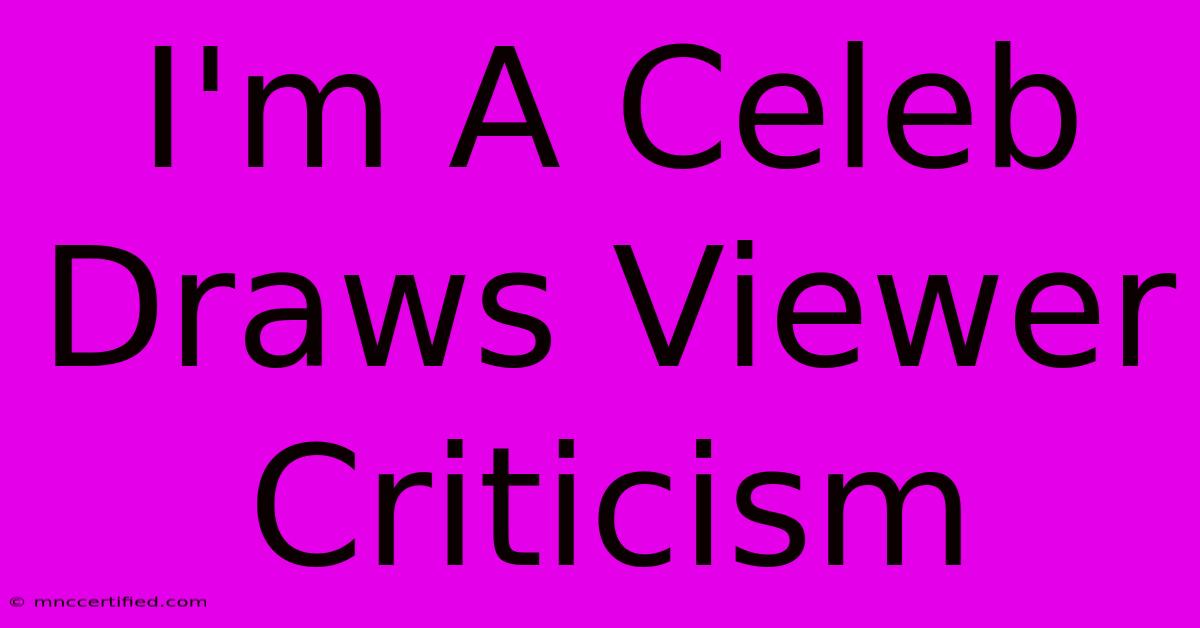I'm A Celeb Draws Viewer Criticism

Table of Contents
I'm A Celeb Draws Viewer Criticism: A Deep Dive into the Controversy
"I'm A Celebrity...Get Me Out Of Here!" has consistently been a ratings winner for ITV, but its recent series have attracted significant viewer criticism. This isn't simply about low-brow entertainment; the backlash speaks to evolving societal values and expectations of reality TV. This article delves into the specific criticisms, their impact, and what it means for the future of the show.
Key Criticisms Facing I'm A Celeb
Several recurring themes dominate the criticism leveled against the show:
1. Lack of Diversity and Representation:
One of the most persistent criticisms revolves around the lack of diversity amongst the celebrity contestants. Viewers frequently point out the overwhelmingly white, middle-to-upper-class demographic, demanding better representation of ethnic minorities, LGBTQ+ individuals, and people from working-class backgrounds. This lack of inclusivity fuels accusations of the show being out of touch with modern Britain. The call for greater representation is not just about ticking boxes; it's about reflecting the rich tapestry of British society and providing relatable role models for diverse audiences.
2. Concerns about Treatment of Contestants:
The show's format, inherently focused on challenging contestants both physically and mentally, has drawn accusations of cruelty and exploitation. Tasks designed to be "gruesome" or "disgusting" have raised concerns about the contestants' wellbeing, particularly their mental health. Viewers have questioned whether the potential for psychological distress outweighs the entertainment value, sparking a debate about ethical boundaries in reality TV. Balancing entertainment with contestant welfare is a crucial consideration for future seasons.
3. The Scripted Narrative Debate:
Although marketed as "unscripted," many viewers suspect a level of manipulation and scripting in the show's narrative. Editing choices, selective showcasing of certain events, and perceived manufactured drama have led to accusations of the production team actively shaping the storyline to maximize impact. This lack of authenticity diminishes the show's credibility and leaves viewers feeling manipulated.
4. The Impact of Social Media:
The rise of social media has amplified both positive and negative feedback on the show. Viewers can instantly react to events, express their opinions, and organize campaigns highlighting concerns. This immediate and widespread response has put significant pressure on the producers, forcing them to be more accountable to public sentiment. Managing the online discourse is now a vital aspect of I'm A Celeb's production.
The Future of I'm A Celeb: Responding to Criticism
The criticisms are not easily dismissed. For I'm A Celeb to remain a relevant and successful show, it needs to actively address these concerns. This requires a multi-faceted approach:
- Increased Diversity in Casting: A conscious effort to cast a wider range of celebrities from diverse backgrounds is paramount.
- Prioritizing Contestant Wellbeing: Greater emphasis should be placed on providing robust psychological support and ensuring that tasks don't cross ethical boundaries.
- Transparency and Authenticity: Greater transparency about the production process and a move away from overly manipulated storylines can build trust with viewers.
- Engaging with Online Criticism: Constructive dialogue with viewers through social media and other platforms is crucial for understanding and responding to concerns.
Ultimately, the future of I'm A Celeb hinges on its ability to adapt to evolving societal values and expectations. Ignoring the criticism will only lead to further decline. Embracing change and prioritizing ethical considerations are essential for the show's long-term survival and success.
Keywords: I'm A Celeb, I'm A Celebrity Get Me Out Of Here, viewer criticism, reality TV, diversity, representation, contestant welfare, ethical concerns, social media, scripted narrative, ITV, British TV.

Thank you for visiting our website wich cover about I'm A Celeb Draws Viewer Criticism. We hope the information provided has been useful to you. Feel free to contact us if you have any questions or need further assistance. See you next time and dont miss to bookmark.
Featured Posts
-
Jets Colts Recap Fourth Quarter Collapse
Nov 18, 2024
-
Planet Networks Pricing Per Month
Nov 18, 2024
-
Is Crypto Allowed In Rhode Island
Nov 18, 2024
-
Afc North Steelers Win Over Ravens
Nov 18, 2024
-
England 8 Bellingham Ireland Match Ratings
Nov 18, 2024